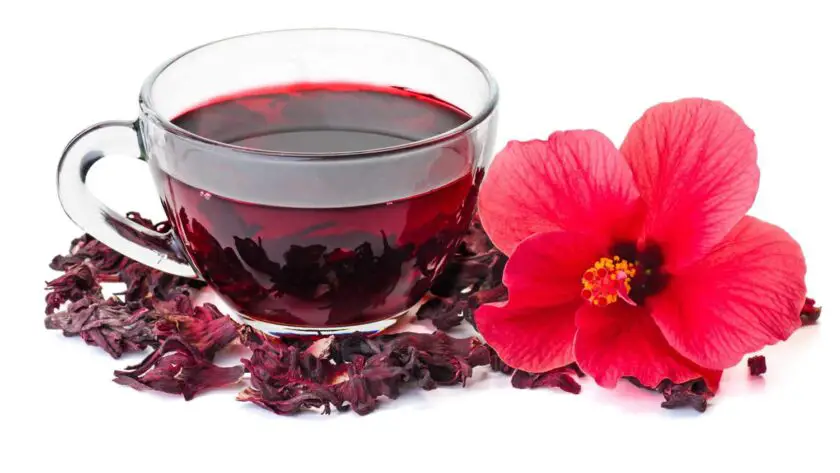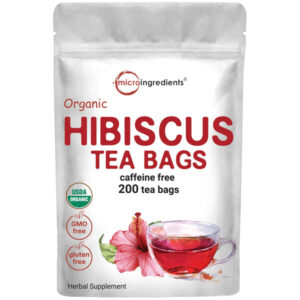For centuries, traditional healers around the world have brewed a vibrantly colored herbal tea made from the dried flowers of a tropical plant. Valued as both a refreshing beverage and a therapeutic tonic, this floral tea has recently caught the attention of researchers for its potential health benefits.
Studies suggest the bioactive compounds found abundantly in the flowers, including potent antioxidants called anthocyanins, may help promote weight loss, reduce bacteria growth, fight cancer cells, and support heart and liver health.
The antioxidants and anti-inflammatory effects of this floral tea come from its unique medicinal compounds: polyphenols like anthocyanins, vitamin C, flavonoids, and other polyphenolic acids. Research has shown these compounds have far-reaching effects throughout the body and may be protective against obesity, cancer, diabetes, bacterial infections, and cardiovascular disease.
In this article, we will analyze the science behind these promising health claims and examine the evidence that this popular flower tea may live up to its traditional reputation as a healing elixir. While research is still ongoing, the initial findings are exciting and suggest incorporating this tea into your diet could provide multiple benefits from slimming your waistline to strengthening your heart.
So what is this mysterious flower that boasts such an array of potential wellness perks? It is none other than the vibrant red hibiscus flower, steeped into a tart, tangy tea found in many kitchens and cafes around the world. Let’s explore the components that give hibiscus tea its distinct healing potential.
The Many Potential Health Benefits of Drinking Hibiscus Tea
For generations, cultures around the globe have valued delicious hibiscus tea not only for its tart, cranberry-like flavor but also for its numerous potential health benefits. Modern scientific research is now confirming many of the traditional medicinal uses of hibiscus tea, especially for preventing chronic diseases and conditions.
What is Hibiscus Tea?
Hibiscus tea is made from the dried red calyces (cup-shaped structures) surrounding the flowers of the hibiscus plant. There are many hibiscus species, but Hibiscus sabdariffa—also known as roselle or red sorrel—is most commonly used for tea.
Like many herbal teas, hibiscus tea contains beneficial bioactive compounds such as polyphenols and anthocyanins that act as antioxidants in the body. Antioxidants help combat free radicals, which are unstable molecules that can damage cells and lead to disease. The powerful antioxidants in hibiscus give this floral tea many of its touted health-promoting properties.
The Delicious History of Hibiscus Tea
For generations, hibiscus tea has been used in folk medicine systems around the world to help treat a variety of conditions. It has been consumed as a diuretic to increase urine output, an antipyretic to reduce fevers, an analgesic to relieve pain, and a sedative to induce relaxation.
Across cultures, people have traditionally drunk hibiscus tea for its cooling properties, its tart flavor, and even its purported weight loss benefits. In Egypt and Sudan, people drink hibiscus tea at special celebrations and offer it to guests as a courtesy. In West Africa and parts of Central America, hibiscus tea is valued for its medicinal properties.
Today, hibiscus tea remains popular around the globe as a refreshing and health-promoting beverage. Its brilliant red color, tangy citrus-like taste, and potential therapeutic effects make it a favorite among tea enthusiasts worldwide.
Exciting Health Benefits Emerging from Research
Modern scientific research is now confirming many of the traditional medicinal uses of hibiscus tea. Studies on cells, animals, and humans suggest hibiscus may offer an array of health benefits, from lowering blood pressure and cholesterol to aiding weight loss and more. Let’s explore some of the most promising health benefits being investigated:
- Lowering blood pressure – Some intriguing research indicates drinking hibiscus tea may be as effective as some blood pressure lowering medications. It appears to work by relaxing blood vessels. This may help reduce the risk of heart disease.
- Improving cholesterol – Studies indicate hibiscus tea may lower unhealthy “bad” LDL cholesterol while raising healthy “good” HDL cholesterol. This may lower the risk of developing heart disease or having a heart attack or stroke.
- Promoting weight loss – Early studies suggest hibiscus extract may promote fat burning and weight loss by blocking the absorption of starch and glucose. It may also curb appetite. This may make hibiscus tea useful for managing obesity.
- Protecting the liver – High in antioxidants, hibiscus tea may prevent liver damage and disease by reducing oxidation and inflammation. Animal studies suggest it may even reverse existing liver damage and fibrosis.
- Fighting bacteria – Test tube research reveals hibiscus tea possesses potent antibacterial properties against certain bacterial strains, including E. coli. More studies are needed to confirm this effect in humans.
- Preventing cancer – Some early lab studies indicate hibiscus extract may inhibit the growth of cancerous cells, especially in the prostate, skin, and GI tract. Further high-quality research is required to explore this anti-cancer effect.
So brew a cup of antioxidant-packed hibiscus tea, sit back, and sip this floral infusion valued for both its enticing taste and its increasing scientific support. Just be sure to check with your doctor about any possible medication interactions before incorporating more hibiscus tea into your routine.
Click Here To Check Out Micro Ingredients High Quality Dried Hibiscus Flowers
A Cupful of Health Benefits
Hibiscus tea has been cherished across cultures for centuries as a tasty beverage with cooling and medicinal properties. While folk medicine has long touted its supposed therapeutic powers, modern science is now uncovering evidence that hibiscus tea may live up to many of its traditional uses after all.
Research suggests the antioxidants and other compounds found in hibiscus may offer benefits ranging from lowering blood pressure and cholesterol to supporting weight loss and even showing some cancer-fighting effects in lab tests. Though robust clinical studies are still needed, findings to date are promising and indicate drinking delicious hibiscus tea may be a wise addition to an overall healthy lifestyle.
Of course, hibiscus tea should not replace any medications or treatment plans prescribed by your doctor. But gradually incorporating a few daily cups of hibiscus tea into your routine just might provide your health an extra infusion of wellness-promoting compounds found in this cherished crimson flower. So brew a batch, sit back, and sip – your body may end up thanking you.






